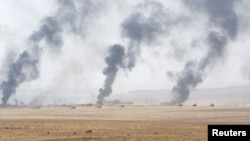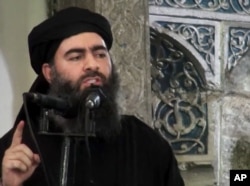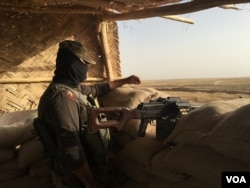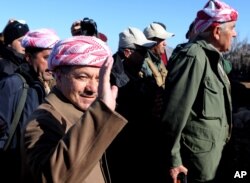Kurdish officials say Islamic State militants are planning to meet a liberation offensive in Mosul with mass killings and widespread destruction of the historic Iraqi city.
IS fighters have been instructed to wreak as much destruction as they can, if they’re unable to hold the city against Iraqi troops and Kurdish peshmerga militiamen, according to Saeed Mamuzini, an official with the Kurdistan Democratic Party, Iraqi Kurdistan’s ruling party.
In an interview in Irbil, the capital of Iraqi Kurdistan, with Rudaw television, Mamuzini said the terror group has been preparing for the long-anticipated offensive on Mosul, which could start possibly this month. Mosul is the last major stronghold of the terror group in the country.
“IS is prepared to fight and they have new tactics of war. For example, they have built tunnels inside Mosul,” he said.
The jihadist defenders are also thought to have “planted improvised explosive devices (IEDs) in most places” and are organizing suicide bombers.
“But the new strategy that was sent from [IS leader] Abu Bakr al-Baghdadi is: If you can defend Mosul, do it, and if you can’t then escape, but leave devastation and mass killings behind,” the Kurdish official added. Top IS leaders are leaving the city, he says, and the group has been transporting out archeological pieces, money and other valuables. European and Middle Eastern fighters have also left, according to Iraqi and Kurdish officials, leaving the defense of the city to a mixture of locals, Turkmen and Chechens.
Iraqi officials estimate IS has about 5,000 fighters in the city. And they have been busy preparing defenses, including digging an elaborate network of tunnels and a moat filled with oil ready to be set ablaze. The smoke will make it harder for coalition pilots to mount close-support airstrikes to help advancing Iraqi troops.
To the south of Mosul, where Iraqi forces have been making slow progress in retaking villages, the militants have already set fire to oilfields; plumes of dark smoke add to a blighted landscape full of destroyed dwellings, some demolished by airstrikes and artillery shelling, others by mortar and rocket fire.
Worsening conditions for Mosul residents
“Daily, people are detained and killed in Mosul by IS. People are in a very bad situation,” says Mamuzini. Food and medicines are in shorty supply and Kurdish officials claim IS has executed in the past month more than 200 young men for refusing to join IS.
The trickle of people, mainly women, escaping the city, confirm IS militants are forcing young men to join their ranks on pain of death. One woman, who fled into Kurdish peshmerga-controlled territory to the east of Mosul, told a VOA translator that her brother had been executed by the terror group but “two cousins had joined” the jihadists.
“They didn’t want to but they wanted to live,” she explained tearfully.
Iraqi officials have vowed to recapture Mosul by year’s end but there have been delays in a push on the city that IS captured more than two years ago.
After a months-long offensive in western Anbar Province, Iraqi troops — backed by a 60-nation coalition led by the U.S. and with peshmerga support — have captured an increasing number of villages around Mosul, but they are still struggling to get the kind of foothold they will need before mounting an assault on the city itself.
IEDS are slowing them down as is IS resistance involving nighttime mortar attacks and commando raids. On July 9, Iraqi forces captured the Qayyarah air base, once known as Saddam Airbase, 80 kilometers south of Mosul. But in the three months since, the Iraqis have only advanced about another 20 kilometers.
A budgetary shortfall for the Kurds following a massive cut in oil-revenue was one of the hold-ups. But in August, U.S. envoy Brett McGurk managed to broker an oil revenue-sharing deal between the government of Iraqi Kurdistan and the Iraqi government, which had quarreled for months over export revenues.
The oil deal has helped with negotiations between the Kurds and Baghdad over the deployment of forces for the offensive on Mosul. A Joint Operations Room has been set between the two sides, and peshmerga has agreed not to enter the Sunni-Arab city during the final assault. They have also agreed, say U.S. officials, to allow the Iraqi Security Forces (ISF) to use territory now controlled by the peshmerga to east and north of the city.
Making way for an offensive
On Monday, the governor of Kirkuk, Najmadin Karim, told reporters that the Kurdistan Regional Government and Baghdad are rebuilding relations, saying the “iceberg” between the two governments is melting. He credited a recent high-level visit to Baghdad by Kurdish President Masoud Barzani.
“The visit was a great beginning to lay the groundwork of preparations for the Mosul liberation operation,” said Najmadin Karim.
Another hold-up has yet to be solved — the ISF has a manpower shortage. The Iraqi forces are thinly stretched.
“Security forces are overextended across Iraq due to increased IS attacks and provincial security issues,” according to Emily Anagnostos, an analyst with the Institute for the Study of War, a Washington-based think tank.
“IS continues to strategically open offensives in northern and western Iraq in order to stretch ISF forces thin and reduce their ability to retake terrain,” she wrote in a research note. This has meant that forces earmarked for a Mosul assault have been tied up. “Meanwhile, IS continues to launch spectacular attacks in central Baghdad, despite the ISF’s concentration in the capital and surrounding belts,” she adds.
On Tuesday, IS claimed responsibility for three blasts in the Iraqi capital which killed 10 people and wounded 18 others. On Monday, the terror group launched three suicide bombings targeting Shi’ite religious processions in Baghdad. Tuesday’s blasts killed at least 10 and injured dozens of others.
IS violence in the Iraqi capital has increased over the last few months, and on Sunday, a United Nations report estimated that in September in Baghdad province 289 civilians had been killed and 838 wounded mainly in terrorist attacks.




